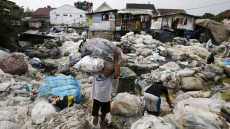Low family income can affect the brain development of children, new research says.
The study, led by researchers at the Children's Hospital Los Angeles (CHLA) and Columbia University Medical Centre (CUMC), was published online in the journal Nature Neuroscience.
"While in no way implying that a child's socio-economic circumstances lead to immutable changes in brain development or cognition, our data suggest that wider access to resources likely afforded by the more affluent may lead to differences in a child's brain structure," said Elizabeth Sowell from CHLA.
In the largest study of its kind to date, the researchers looked at 1,099 typically developing individuals between the ages of 3 and 20 years.
Associations between socio-economic factors (including parent education and family income) and measurements of surface area of the brain were drawn from demographic and developmental history questionnaires, as well as high-resolution brain MRIs.
The findings showed that income was associated with brain surface area.
"Specifically, among children from the lowest-income families, small differences in income were associated with relatively large differences in surface area in a number of regions of the brain, associated with skills important for academic success," said study first author Kimberly G. Noble from CUMC.
Higher income was also associated with better performance in certain cognitive skills.
"Family income is linked to factors such as nutrition, health care, schools, play areas and, sometimes, air quality," said Sowell, adding that everything going on in the environment shapes the developing brain.
"Future research may address the question of whether changing a child's environment - for instance, through social policies aimed at reducing family poverty - could change the trajectory of brain development and cognition for the better," the researchers said.





